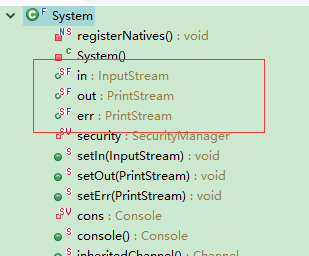java程序在不同操作系统上运行时,可能需要取得平台相关属性,或者调用平台本地命令(如windows下sys32和system64下的可执行文件、本地其他语言写的函数等) 来完成特定功能.java提供了System和Runtime两个类来与程序的运行平台交互。
1.System类
首先,看构造器(constructor),是一个私有的构造器,这里注释写明java程序不能创建System对象,因静态代码块里面定义了一个nativ方法registerNatives(),代码运行时,需依赖虚拟机的相关参数来初始化该类的实例;
public final class System {
/* register the natives via the static initializer.
*
* VM will invoke the initializeSystemClass method to complete
* the initialization for this class separated from clinit.
* Note that to use properties set by the VM, see the constraints
* described in the initializeSystemClass method.
*/
private static native void registerNatives();
static {
registerNatives();
}
/** Don't let anyone instantiate this class */
private System() {
}
其次Syetem类提供了代表标准输入、标准输出和错误输出的类成员,这里的System.in 和System.out,在通过Scanner类可进行人工程序输入互动;

最后System类还提供了一些静态方法用于访问环境变量、系统属性的方法(这里列举一些认为常用的,具体可以参考该类的API);
package based.libraries;
import java.util.Map;
/**
*
* @author fan
*2018年8月9日
*/
public class SystemTest {
public static void main(String[] args) {
/**
* 通知系统进行垃圾回收
*/
System.gc();
System.runFinalization();
/**
* 当前毫秒数
*/
System.out.println(System.currentTimeMillis());
/**
* 加载 c写的AuCpuCardForJava.dll,之后可以定义java 的nativ类型的方法,执行效率较高
*/
System.loadLibrary("AuCpuCardForJava");
/**
* 准确计算任意对象的hashCode值,如果hashCode()有重写,此处的hashCode唯一标注该对象实例
*/
System.out.println(System.identityHashCode(System.in));
/**
* 获取系统所有运行环境
*/
Map<String,String> envs = System.getenv();
for (String key : envs.keySet()) {
System.out.println(key+"------------------>"+envs.get(key));
}
System.out.println("-------------------分割线------------------------");
/**
* 获取指定环境变量的value
*/
System.out.println(System.getenv("JAVA_HOME"));
System.out.println("-------------------分割线------------------------");
/**
* 获取所有系统属性
*/
System.out.println(System.getProperties());
}
}
2.Runtime类
Runtime类描述Java运行时环境,即每一个程序都有一个对应的Runtime实例,应用程序通过该对象和与运行环境关联;
构造器与Sytem相同都是私有的,但多了一个public 的getRuntime()方法获取实例--单例模式(思考下这里为什么没判断为null?因为没必要!);
public class Runtime {
private static Runtime currentRuntime = new Runtime();
/**
* Returns the runtime object associated with the current Java application.
* Most of the methods of class <code>Runtime</code> are instance
* methods and must be invoked with respect to the current runtime object.
*
* @return the <code>Runtime</code> object associated with the current
* Java application.
*/
public static Runtime getRuntime() {
return currentRuntime;
}
/** Don't let anyone else instantiate this class */
private Runtime() {}
与System类 类似,Runtime也定义了一些静态方法来与运行环境互通,和访问相关参数。多说一句,System类的gc(),runFinalization(),loadLibrary()其实都是间接调用了Runtime对应的方法,具体详见源码。
package based.libraries;
import java.io.IOException;
public class RuntimeTest {
public static void main(String[] args) throws IOException {
Runtime rt = Runtime.getRuntime();
System.out.println("处理器数量"+rt.availableProcessors());
System.out.println("空闲内存"+rt.freeMemory());
System.out.println("总内存"+rt.totalMemory());
System.out.println("可用最大内存"+rt.maxMemory());
String str ="";
Object obj =new Object();
RuntimeTest rts = new RuntimeTest();
}
}














